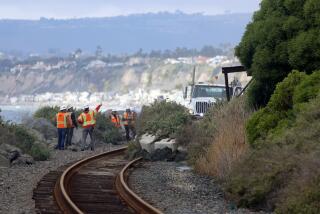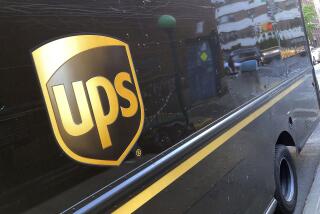Regulators Ease Oversight of Union Pacific
- Share via
A national shipping crisis arising from massive congestion on the Union Pacific railroad system has eased enough that the freight carrier no longer needs intense federal oversight, regulators said Friday.
But Union Pacific itself said the problems--which included severe delays at Southern California’s seaports and at Union Pacific’s big switching yard in Colton--are by no means fixed, and that the job of restoring service to normal levels “is far from finished.”
There also is concern over whether Union Pacific will adequately handle the surge in freight deliveries, including huge quantities of Asian imports into the ports, that will soon begin in advance of the holiday shopping season. Union Pacific is the nation’s largest railroad, with about 35,000 miles of track.
Separately, the railroad’s parent company, Union Pacific Corp., scrapped plans to spin off its Overnite Transportation trucking business to the public. The company cited “market conditions,” but the unknown outcome of an intense organizing effort by the Teamsters union also played a key role.
As for the railroad, the U.S. Surface Transportation Board (STB)--citing major improvements in the Houston and Gulf Coast areas, where the crisis began--decided against extending the emergency order it imposed nine months ago, overriding objections from some shippers that had sought continued federal oversight.
The unprecedented emergency action tried to help ease the logjam partly by giving two rival railroads--Burlington Northern Santa Fe Corp. and tiny Texas Mexican Railway Co.--access to Union Pacific’s routes in the Gulf Coast region.
Although it didn’t extend the emergency action, which is set to expire Sunday, the STB did provide a 45-day “wind-down period” for Union Pacific, other railroads and their customers to make the transition to pre-crisis operations.
“Do we think the worst is behind us? Absolutely,” said Gary Schuster, a spokesman at Union Pacific’s Dallas headquarters. “We think we have the system in place to handle the traffic.”
The crisis flared a year ago after Union Pacific bought Southern Pacific Rail Corp., a struggling railroad with routes stretching through California and east to Texas and the Midwest. Union Pacific struggled to merge the two carriers’ equipment and personnel, and bad weather and a jump in grain shipments exacerbated matters.
The gridlock stranded Midwest crops; clogged ports; delayed shipments of basic materials such as coal, chemicals and lumber; and otherwise forced hundreds of companies to pare production or pay higher shipping costs.
Various estimates said the gridlock cost the U.S. economy more than $2 billion. Union Pacific itself suffered losses totaling $633 million during the nine months ended June 30.
Its delays are still hobbling the ports of Long Beach and Los Angeles, though the railroad claims conditions there are improving. In its most recent weekly report to the STB, Union Pacific said it’s taking “aggressive steps to reduce congestion” at the ports, partly by using more trains in the area.
Don Wylie, the Long Beach port’s director of trade and maritime services, was more guarded. “Things are not getting worse,” he said. “We’re nowhere nearly as bad as we were last fall, but we are still concerned.”
For now, investors cheered the STB’s move. Union Pacific’s stock rose $1.75 a share to close at $42 in New York Stock Exchange composite trading on a day when the overall market plummeted.
Union Pacific also had hoped to raise about $550 million by selling Overnite’s stock to the public. But with trucking stocks slumping in recent weeks and the Teamsters union pressing for a contract, Union Pacific yanked the deal.
The Teamsters had urged investors to shun the stock offering, partly because Union Pacific planned to leave Overnite with $109 million worth of debt, which “was too much for a company with a small profit margin,” said Teamster spokesman David Cameron.
More to Read
Sign up for Essential California
The most important California stories and recommendations in your inbox every morning.
You may occasionally receive promotional content from the Los Angeles Times.














